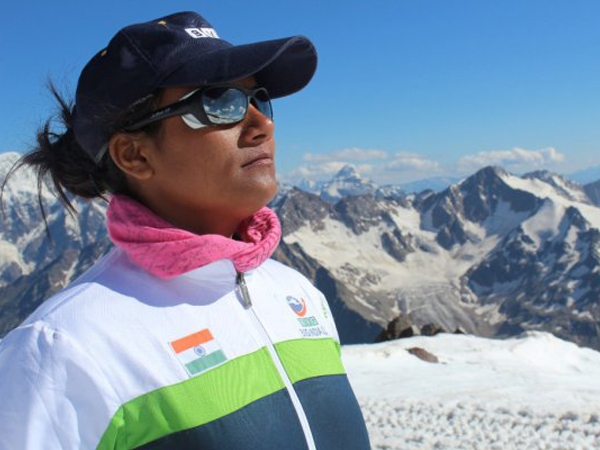
She is the current social media sensation and certainly for the right reason. Sofia Ashraf, the woman behind the viral video Kodaikanal Won’t is going places and has garnered attention for taking a stand against corporate giant Unilever for dumping mercury waste in Kodaikanal, Tamil Nadu. Sure she comes across as a rebel who won’t back down, but that’s not how it always was. Sofia tells iDiva about her inspiring journey from a conservative Muslim family to being a rockstar rapper.
Born and brought up in Chennai, Sofia comes from an orthodox Muslim home. Her sheltered upbringing meant never going out alone at night, no clubbing, no going to cafes and sleepovers were simply out of the question. At the age of 22, she gave up on organised religion in order to search for “inner satisfaction.” She realised the life she had lived thus far was not what she wanted for the rest of her life. An expressive and vocal person, there was something that held her back from her freedom. After her long wait to break free, she finally walked out of the house and moved to Bombay at the age of 23.
“I still remember the night I spoke to my parents about my decision to move out. I did not ask for permission, I told them that the decision was already made and I was just informing them. My parents sat in silence. There was a long pause. Like a normal child, I was expecting screams, drama, emotions but there was only silence. That was the scariest silence of my life,” she says, recounting the experience.
Gradually everyone came to terms with the fact that Sofia was leading a life of her own. She house-hunted along with her uncle in Mumbai, while her mom helped her move in and settle in the city of dreams. “Since then it has been a journey of self-discovery with a live-and-let-live relationship with her loved ones,” she says.
Sofia was brought up with the idea that women don’t go to work, and that once she completes her education she must settle down with a man and live happily ever after. But she had different plans altogether. She wouldn’t marry someone for the sake of it.
Being a creative girl, Sofia began her career by experimenting with various jobs. Writing for greeting cards, theatre, choreography, Sofia has tried it all. It was only when she was offered a job with Asia’s largest advertisement company Ogilvy & Mather that she moved to Mumbai to pursue her career. “That gave me the courage to go to my parents and tell them that I was moving out to lead my life my way,” she says.
Rapping for Sofia is her means of expression. “Rapping combines two of my favourite things – writing and music; it’s like lyrical prose.” She began rapping in her college days when she was an under grad. Now well-known as a successful Indian rapper, she still says she is a writer first. Sofia believes she is more like a content creator. The famous Kodaikanal Won’t video is more about its content than the music or rapping style.
Even after joining an advertisement firm as Creative Supervisor, Sofia never gave up on her love for rapping. In fact the company too helped her pursue the alternative career with their very best efforts.
When quizzed about the video, the first t hing she says is “Painting me as the face of the whole campaign is unfair to the people who kept working for years to bring light on this issue.” Many NGOs have rigorously worked towards bringing attention to Unilever’s hypocrisy. The company has maintained a positive image in front of the public but the truth is completely different.
At the beginning, Sofia wasn’t too convinced about the issue. Firstly she there was a conflict of interest as the company she worked for had Unilever as their client. Naturally a tough call. “However, it was an eye opener for me to learn what Unilever was presenting as fact in front of the world was contradictory to the reality,” she explains. After her rigorous research, Sofia learnt about how beautifully the corporate giant hid the nasty dumping work from the world so as to not be seen in bad light. That’s when Sofia decided to take matters in her own hands.
But Sofia believe videos aren’t powerful enough to bring about a change. “Videos are something you notice one day and forget the next day,” she says. She thinks the only good these powerful videos do is bring pressure and provide a phenomenal reach. Pressure from the public can never be underestimated. There is a petition filed against Unilever for dumping mercury poisoning substances and Kodaikanal Won’t has brought light to the subject matter. The one thing that this social media video helped do is reach the unreachable. The video went viral not only in India but around the world. In fact Unilever’s CEO Paul Polman tweeted about the video.
Don’t accept different standards.All humans same.We need gov to agree and move #UnileverPollutes .Determined to solve fast.Too slow progress
— Paul Polman (@PaulPolman) August 6, 2015
Working actively solution kodai #UnileverPollutes for several years already Determined to solve.Need others too and facts not false emotions
— Paul Polman (@PaulPolman) August 6, 2015
Sofia Ashraf is a true blue feminist but it wasn’t always that way. Sofia shares, “I was an anti-feminist. I could never look like the so-called feminist women, the bindi and cotton sari-wearing, bra-burning and men-hating women. The idea of feminism then was way different from what it is now.”
Over the years, Sofia has learnt that many of her male friends did not even know about the problems faced by women. They aren’t even aware about how unsafe a woman feels in the city. Hence, to keep reminding men about the issues and problems is a must. Many men hang out with women who are strong and self-satisfied, and they believe all women are equally strong and the city is safe for them to live, but it isn’t.
So what does freedom mean to Sofia? Well, freedom from guilt is of topmost importance to her. Sofia says, “When a woman tries to lead her life on her own terms, she is made to feel guilty of being selfish.” She adds, “On my recent visit home, I found my grandmother asking me how I can do this. How can you only seek your happiness and not think about parents and family? That’s exactly what we women need to be free from and do what they really want to instead.”
This story is part of our Independence Day Special, #FreedomRedefined. We are looking for more stories of women who broke free from the shackles of society’s stereotypes and suppression. Write to us on idivaeditor@gmail.com if you know of such women or if you have a story to tell.
More On >> Work & Life




